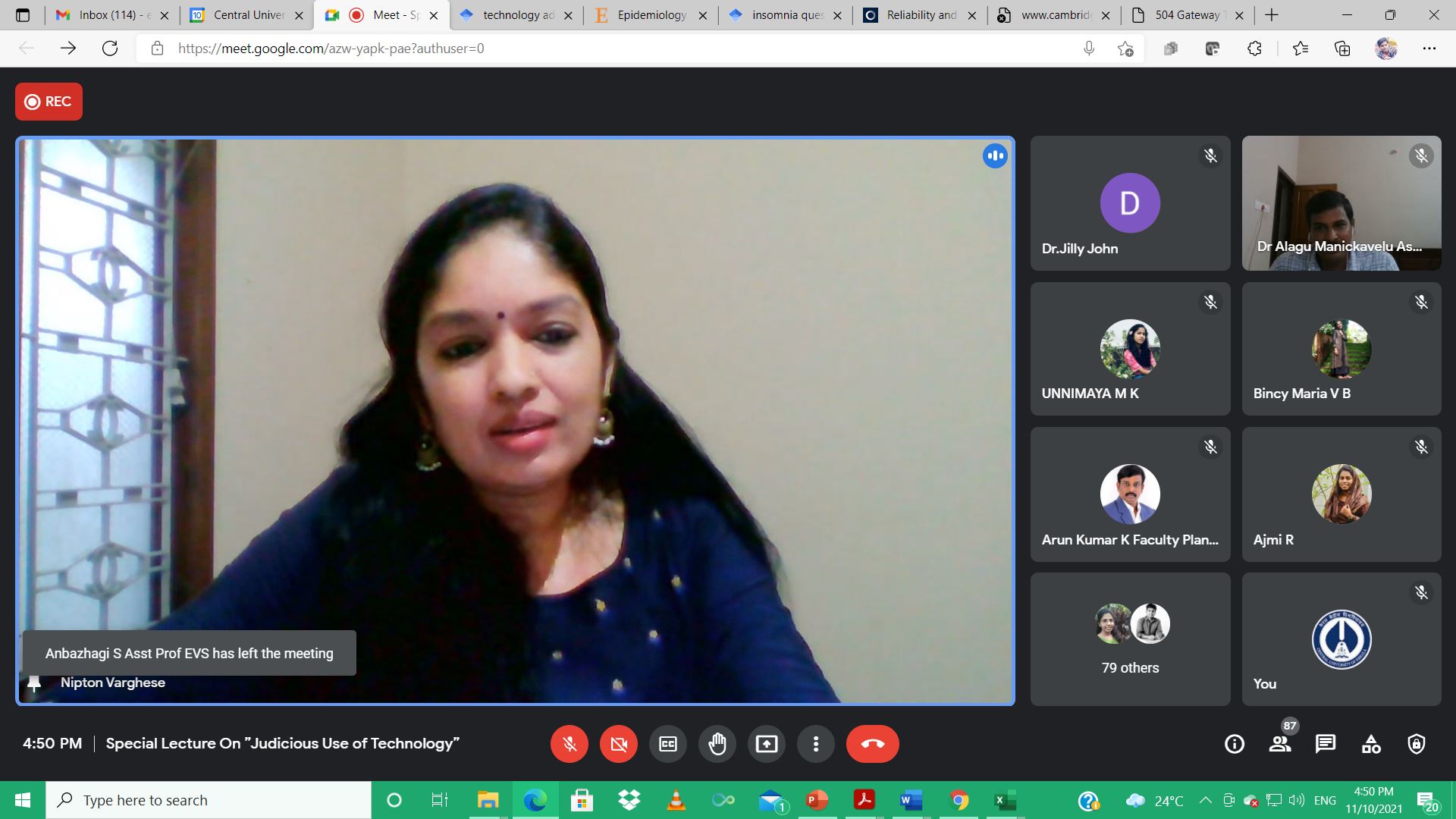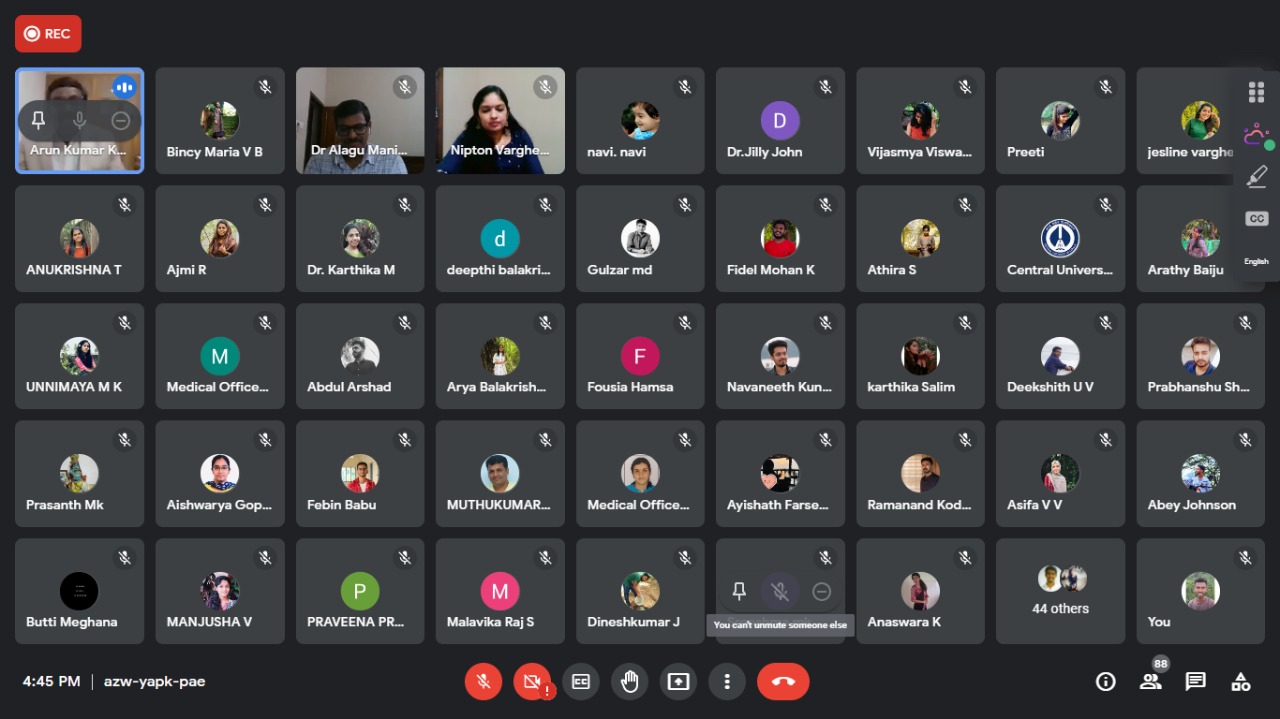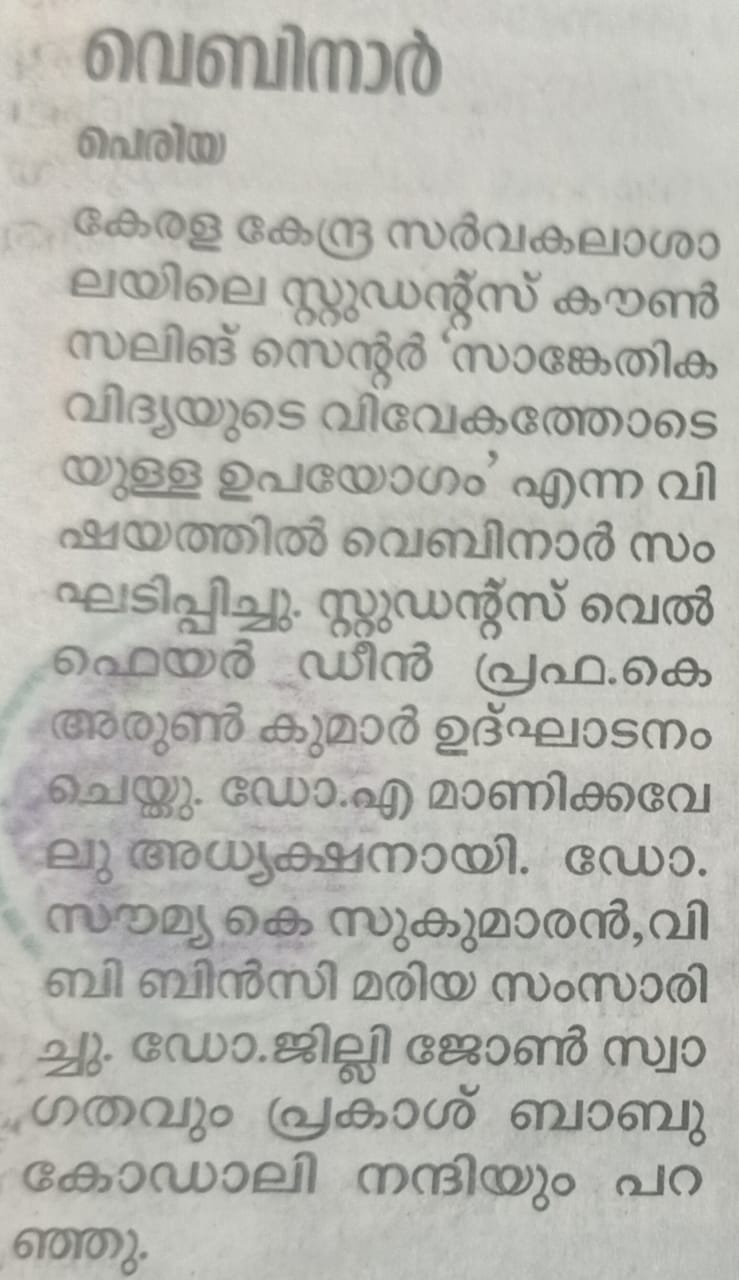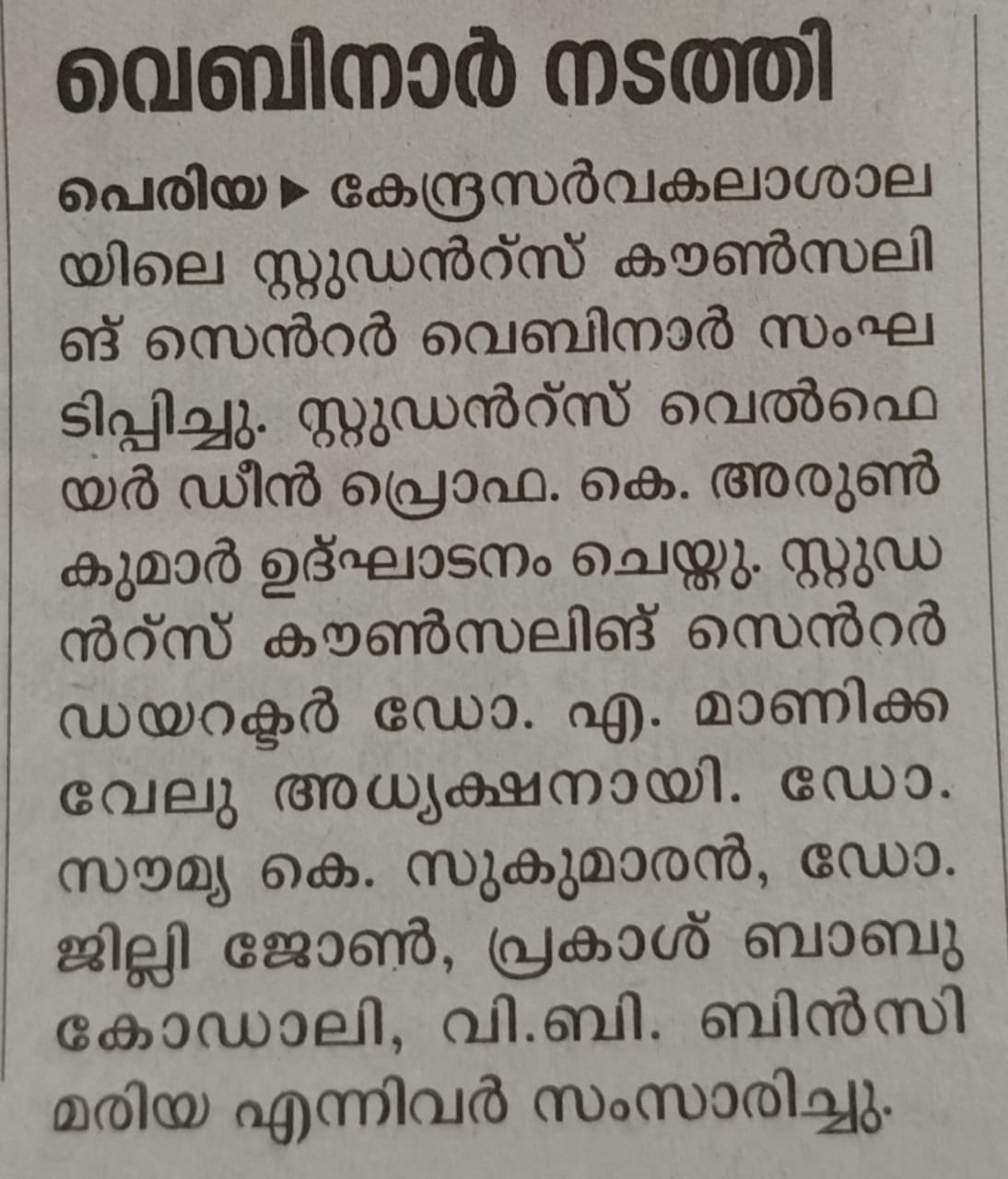Major Programmes Undertaken by the Student Counselling Centre
I. Workshop on “Empowering Self”
The Student counselling centre of central university of Kerala had organized a one-day workshop entitled “Empowering Self” on 24 th October 2017 in the seminar hall of Central University of Kerala (CUK), Periye campus for the students of CUK. The programme was inaugurated by Dr. Muralidhar Nambiar, COE, CUK and presided by Dr. Mohan AK, Head of Department of Social Work. Dr. Laxmi, co-ordinator of counselling centre welcomed the guests and delegates.
Dr. Muralidhar Nambiar in his inaugural speech mentioned about the importance of counselling especially in educational institutions like schools, colleges and universities. He advised all the participants to make use of the workshop and the counselling centre in redressing their issues. Dr. Mohan A K in his presidential speech spoke about the importance for the need of counselling for students and the need for a well-established counselling centre. Dr. Manickvelu, Dean, Student Welfare was present in the programme. Around 75 students from various departments of CUK had participated in the programme. Prof. G K Venkatesh Kumar, Professor of Psychology from Mysore University was the resource person for the programme. Dr. Renjith Pillai, Joint co- ordinator of counselling centre delivered the vote of thanks.

Inauguration Ceremony of Workshop on ‘Empowering Self’
II. Three-day Capacity Building Training programme for School Counselors on Prevention of Drug Abuse (17 th to 19 th September 2018)
The three-day capacity building training programme for the school counsellors in Kasaragod district was organized by Student counselling Centre, Central University of Kerala with the support of National Institute of Social Defence at Central University of Kerala. The participants of the workshop were school counsellors who are working in different government schools in Kasaragod district of Kerala and were from the Social Work and Psychiatry background. The capacity building programme was divided into different sessions. The topics were handled by eminent resource persons. Most of the sessions were interactive and activity-based.
Day One of the Capacity building programme (17 September 2018)
A grand inauguration ceremony was held to mark the beginning of the three day workshop. The event was presided by Dr Radhakrishnan Nair, Registrar of the Central University of Kerala and welcomed by Dr Laxmi, Co-ordinator of student counselling centre, Central University of Kerala. Prof. (Dr.) G. Gopa Kumar, honorable vice chancellor of Central University of Kerala, inaugurated the three-day training programme which was falicitated by Dr A Manickavelu, Dean of student welfare. The inaugural ceremony was concluded with the vote of thanks proposed by Mr. Anoop C Choolayil research scholar, Department of Social Work.

Inauguration: Prof (Dr.) G Gopa Kuman, Former Vice Chancellor, CUK
Dr Mohan A K, Head of the Department, Department of Social Work, Dr Dilip Diwakar G and Dr Jilly John, MSW students and Research scholars of the Department of Social Work, were also part of the gathering.

Inaugural Function
Day 1 of Training session
The first and second session of the Three-day capacity building programme for the school counsellors was handled by Dr Shweth K T, Director of Anirvedha Resource Centre for Psychological Well-Being, Mangalore. The trainer introduced and reinstated participants knowledge on counselling. Counselling is a concept that has existed for a long time. We have sought through the ages to understand ourselves, offer counsel and develop our potential, become aware of opportunities and, in general, help ourselves in ways associated with formal guidance practice. In most communities, there has been, and there still is, a deeply embedded conviction that, under proper conditions, people can help others with their problems. Some people help others find ways of dealing with, solving, or transcending problems. In schools, if the collaboration between teachers and students is good, students learn in a practical way. Young people develop degrees of freedom in their lives as they become aware of options and take advantage of them. At its best, helping should enable people to throw off chains and manage life situations effectively. Counselling, in different forms and with different interpretations, has existed in societies for a long time. Counselling has now become institutionalized. Schools, for example, have to a large extent taken over the task of providing psychological support to boys and girls. The differences and contradictions in present-day counselling have their origin in the social and historical forces that have shaped modern culture. People in all societies, and at all times, have experienced emotional or psychological distress and behavioural problems. In each culture, there have been well established ways and methods of helping individuals with their problems. Counselling is a learning-oriented process, which occurs usually in an interactive relationship, with the aim of helping a person learn more about the self, and to use such understanding to enable the person to become an effective member of society. Counselling is a process by means of which the helper expresses care and concern towards the person with a problem, and facilitates that person's personal growth and brings about change through self knowledge.
Ms. Shweth KT: Counselling

Dr Shweth K T discussed the importance of rapport building, empathy, paraphrasing and difficulties of self-disclosure in the school counselling. The trainer also conducted a paraphrasing exercise which assures the client that the counsellor is actively listening. Further, a role play of student - counsellor interaction was also conducted. The trainer concluded the session by discussing the important cases the trainer handled during her career.
Session three and four were conducted by Dr Akshatha Karanth, Assistant professor, SDM College, Mangalore. Dr Akshatha Karanth dealt with ethics in counselling, the essential qualities required for a counsellor and the importance of school counselling. Training session started with an activity to understand the importance of listening. Subsequently, the trainer discussed on the; ethics that should be abided by social workers which include maintaining confidentiality and case discussion on breaking confidentiality, autonomy(principle of Self-determination), non- maleficence, justice, self-respect, boundaries of counselling, relationship with the former client, termination and referral.
In the fourth session resource person trained participants on the importance of the Professional and personal quality, a counsellor should possess. Professional qualities of counsellor include attitude or way of dealing with people, personality of therapist ( the way counsellor speak, facial expression, body language, dressing and dealing with clients,) professional qualities of a counselor, ( belief of counsellor, expresses emotions, knowledge and skill proper learning of counsellors role, flexibility self-awareness & pride caring attitude, positive regard, sincere appreciation, reassurance(encouraging clients positives), empathy, good psychological health, monitoring and recording.

Session by Dr. Akshatha Karanth
Personal qualities of a counsellor- mindfulness (non-judgmental attitude), appropriate concern, empathy, respectfulness and acceptability, knowledge of culture and tradition of the client, strength to work for the client, identify with mankind, creative and sense of tragic. Towards the end of the session, Participants were divided into four groups, to discuss the need for counselling in schools- issues of students in a school setting, issues of parents, issues of teachers and administration issues.

Group Discussion
Day Two of the Capacity building programme (18th September 2018)
In the first Session, Mrs Sunila Purushotham, Senior school counsellor, Mangalore, dealt the Areas of counselling required in the school setting through case discussion. Different cases ranging from alcoholism, substance abuse, porn addiction and similar habitual addiction, IQ related issues, peer and parental causes which result in dependency on drugs and alike were discussed, along with the techniques used by the trainer for resolving the problem.

Mrs. Sunila Purushotham: case discussion on areas of counselling required in school
The second session was handled by Mr Nirmal Kumar N, HRD trainer, Kasaragod, on addiction, types of addiction and its causes, the impact of addiction on children and their immediate environment, physical, psychological social, familial impact of addiction. Issues in the communication and stages of dependency towards substance addiction were discussed in detail through activity based sessions. Mr. Nirmal Kumar further spoke about the roles and responsibilities of school Counsellors in addressing drug issues in the schools. He further presented various cases related to causes and types of drugs based on his experiences. The session sensitized the participants about addiction, types of addiction, causes and impact. The participants came out with various kinds of doubts and clarified with the resource person. The session was interactive and provided an opportunity to think and analyse various aspects related to drug abuse and its prevention.

Mr. Nirmal Kumar: Types, causes and impact of drugs.
The final session of the second day was dealt by Mr Philip Thomas, secretary (sub-judge) of DELSA and former magistrate. The session title was “Legal provisions in India to combat substance abuse: Narcotic Drugs and Psychotropic Substances Act 1985”. The Narcotic Drugs and Psychotropic Substances Bill, 1985 was introduced in the Lok Sabha on 23 August 1985. It was passed by both the Houses of Parliament and assented by the President on 16 September 1985. It came into force on 14 November 1985 as THE NARCOTIC DRUGS AND PSYCHOTROPIC SUBSTANCES ACT, 1985 (shortened to NDPS Act). Under the NDPS Act, it is illegal for a person to produce/manufacture/cultivate, possess, sell, purchase, transport, store, and/or consume any narcotic drug or psychotropic substance.

Day Three of the Capacity building training programme (19th September 2018)
The first and second session was dealt by Mr Joseph Antony, Mark and Phil Associates, on Addiction counselling and its importance. The training session started with the motivation behind giving importance to substance abuse as the main subject of Addiction, addiction counselling, pre-requisites for a counsellor, application of behaviour modification therapies in addiction counselling.
The third session was conducted by Mr Prakasha Amin, Senior research scholar, Central University of Kerala, on De-addiction counselling – process and counselling significant others. The approaches a counsellor should follow especially in addiction counselling.

Mr. Prakash Amin: activity based session on counselling process
Following the session Dr Dilip Diwakar G, Assistant Professor, Department of Social Work, Central University of Kerala, dealt on the importance of conducting drug awareness programmes in the community and role of the social worker in community setting. Dr. Dilip Diwakar pointed out the process of identifying the needs of the community and role of the community organizer in understanding the needs of the community. Further he also emphasized on the role of community organizer in identifying and addressing the drug abuse issues in the community and role of the community worker in generating the awareness.

Dr. Dilip Diwakar: Importance of conducting drug awareness programmes in community
Valedictory Function
The valedictory function was presided by Dr Mohan A.K, Head of the Department, Department of Social Work. Dr Manickvelu, Dean of Student welfare felicitated the valedictory function and Dr Laxmi proposed the vote of thanks which put an end to the Three-Day capacity building programme for school counsellors on the prevention of Drug Abuse.

Feedback by the Participant
III. Webinar on ‘ Self-care matters in mental health’
On 3 August 2020, the Centre for Women’s studies in collaboration with the Student Counselling Centre of Central University of Kerala, Kasargod, Kerala, organised a webinar on the topic ‘ Self-care matters in mental health’. The resource person of webinar was Dr. Sojan Antony, Assistant Professor in the department of Psychiatric Social Work of National Institute of Mental Health and Neuro-Sciences (NIMHANS), Bangalore. The webinar saw an active participation among the students and faculty of the University and highlighted on the necessity of staying mentally healthy and self-monitoring of the same.
 IV. ‘Manodarpan’ to address mental health challenges of students, teachers and parents during covid-19 and beyond
IV. ‘Manodarpan’ to address mental health challenges of students, teachers and parents during covid-19 and beyond
In the wake of COVID 19 outbreak, the Ministry of Human Resource Development launched an initiative called MANODARPAN to provide Psycho social support to students, teachers and families in need of assistance. The initiative was inaugurated by the Union Minister for Human Resource Development on 21st July 2020. A link to the MANODARPAN portal has been set up in the web page of the ministry. The portal contains advisories, practical tips, posters, videos and do’s and don’ts to stay mentally healthy. The initiative was a part of the Atmanirbhar Bharat Abhiyan aimed at strengthening human capital, increasing productivity and efficient reform and initiatives for the education sector. Manodarpan cell, NCERT, New Delhi has identified volunteers all over the country to provide psycho-social support for students, parents and teachers and has created a directory of the counsellors. The counsellors include social workers, psychologists and other professionals trained in counselling. The link and toll free number are displayed in the website of MHRD and the websites of educational institutions. Persons in distress and persons seeking information and clarification can contact the counsellors over phone through the toll free number. The counsellors are given time slots in which they receive cases over phone to provide psycho-social support. Psycho-social support can include mental health, counselling, education, spiritual support, group support, and many such services. These services are usually provided by mental health professionals, such as psychologists, social workers, counsellors and others. Psycho-social support mainly focuses on techniques like ventilation, empathy, active listening, externalization of interest, value of relaxation, social support and value of spirituality depending on the nature and severity of the problems expressed by the person in distress (client). Some common problems of students include poor concentration in studies, temptations to watch porn movies, professionals having relationship issue which affect other areas of life, laziness among students due to no physical classes, postponing of exams by the university (fear of losing and postponing of one year), dilemmas related to career choices, addiction, sex and sexuality, unavailability of transportation to attend exam centres, inability to pay the school fee, non-publishing of results and so on. Psycho-social support is given to every individual based on the nature of their problem and proper information is shared to them in the related areas.


 V. Special Lecture on ‘Judicious Use of Technology’
V. Special Lecture on ‘Judicious Use of Technology’
Technology brings skills, knowledge, process, technique, and tools together for solving problems of human beings, making their life secure and easier. In this context Central University of Kerala, Student’s Counselling Centre organized a special lecture on the topic ‘Judicious Use of Technology’. The webinar was conducted through Google Meet on 10th November at 4:30 pm. The program mainly focused on throwing light on various dimensions of wise use of technology.
Prof. Dr. K Arun Kumar, Dean Student’s Welfare, Central University of Kerala, inaugurated the session through his soulful insights regarding the merits and demerits of ICT (Information Communication Technology) and on the relevance of such an initiative during this difficult time. Dr. Jilly John, Deputy Director Student’s Counseling Centre and Programme Coordinator of the special lecture welcomed the gathering. Dr. A Manickavelu, Director, Student’s Counseling Centre presided the programme. Dr. Sowmya K Sukumaran, Clinical Psychologist, Govt. Mental Health Centre Kozhikode led the session discussing various topics related to Judicious Use of Technology. The resource person explained the normalities and abnormalities in use of gadgets and causes and consequences of over use of technology with reported cases and research findings. Queries on various issues of great contemporary significance such as alternative ways to get a gadget productive were addressed. The session was truly eye-opening and informative. The University and the Student’s Counseling Centre providing the students with various platforms and programs to enhance the value and personality of each student. Social Work Student Bincy Maria V B has moderated the session and Mr. Kodali Prakash Babu Member of Student’s Counseling Centre committee concluded the session by delivering Vote of Thanks.



